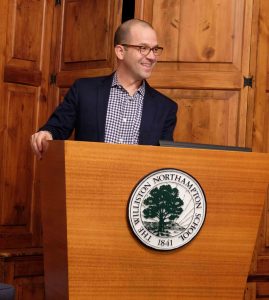
Paul Kalanithi, a promising young neurosurgeon, wrote a poignant opinion piece in the New York Times in 2014 about receiving a diagnosis of stage IV lung cancer. The article struck a chord with readers and was one of the most viewed and shared that year. Fielding multiple offers from publishers, Kalathini sought advice from Andy Ward, a book editor friend-of-a-friend. Ward told Kalanithi to get a literary agent, and to send a book proposal. A year later, the proposal arrived. Those 20,000 words, roughly 80 pages, Ward said, were “the best I’ve received in all my time in publishing.”
Kalanithi’s book When Breath Becomes Air quickly topped the New York Times best-seller list for nonfiction when it debuted in 2016, and spent 13 weeks on that list. It has sold a million copies and has been translated into 34 languages, including Mongolian.
Ward was on campus recently for the final installation of Williston’s 2016-17 Writers’ Workshop Series. He spoke about shepherding Kalanithi’s 20,000-word proposal toward a finished manuscript, telling the 60 audience members (students, parents, and members of the public), “I ended up acquiring a book that asked what it is to live a meaningful life.”
Ward has edited many books in his seven years at Random House, where he’s editor-in-chief of nonfiction, and he found that while Kalanithi’s memoir had great literary merit, its editing presented unique challenges. For one, Kalanithi died suddenly and unexpectedly three months after providing Ward with a first draft. Aside from the considerable grief this caused, there was the logistical puzzle of what to take from Kalanithi’s writings and how to put them together in a way that would be true to the author’s voice and intent.
Ward met with Kalanithi’s widow Lucy, and pored over the doctor’s writing, at first paralyzed by the responsibility. After moving past that initial block, however, Ward was able to follow the “map” left by Kalanithi toward a work of nonfiction about which New York Times critic Janet Maslin said, “I guarantee that finishing this book and then forgetting about it is simply not an option.” This praise helped topple the final potential difficulty: marketing the book without the benefit of its author. The reading public flocked to Kalanithi’s simple and moving prose.
“These are questions we all face,” said Ward in explaining why the book has universal appeal. The success is “a testament to Paul, who’s asking us to reckon with these questions.” Defying expectations, the book isn’t a downer. “There’s something anti-depressive about the book, once you get past the idea that it’s about death.”
Ward called When Breath Becomes Air “beautifully written, utterly clear, with a sense of urgency.” Kalanithi, ever the seeker, studied literature and philosophy before turning to medicine, and this seems to have given him the capacity to explore mortality with great insight. Ward seemed to be stirred by emotion at the end of his talk when he read the author’s note to his then-infant daughter. Amplifying that personal loss is the loss to humanity as a whole. “The saddest thing,” Ward said, “is that we won’t get to read more of Paul as a writer.”

